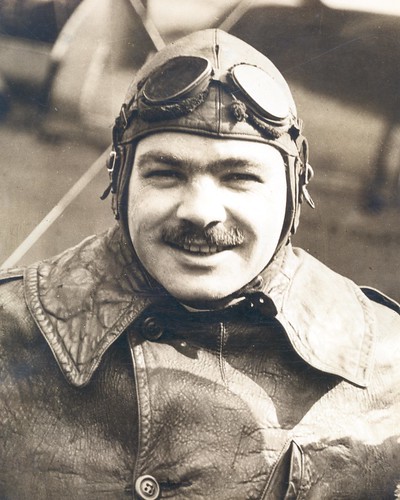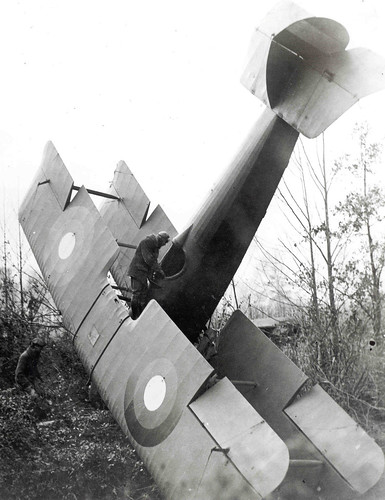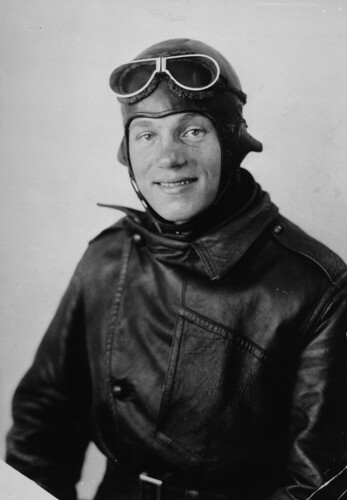 Just last week, we uploaded some new photos of early US airmail from the National Postal Museum to the “People and the Post” set on the Flickr Commons. I was immediately drawn in by the portraits of the early airmail pilots—proud-looking, sometimes scrappy, and often outright handsome standing in their flying gear near their planes. They seemed to have a certain energy about them, and as it turns out, they also had some pretty interesting stories.
Just last week, we uploaded some new photos of early US airmail from the National Postal Museum to the “People and the Post” set on the Flickr Commons. I was immediately drawn in by the portraits of the early airmail pilots—proud-looking, sometimes scrappy, and often outright handsome standing in their flying gear near their planes. They seemed to have a certain energy about them, and as it turns out, they also had some pretty interesting stories.
In the early 20th century, aviation technology was still in its infancy and not yet very safe, and the conditions that airmail pilots flew in were often horrendous. So much so, that flying for the airmail was “considered the next thing to suicide” because of the danger involved. Pilot James C. Edgerton was the first pilot to navigate through a thunderstorm while carrying mail.
 Wesley Smith, “a cigar-smoking pilot known for his stubbornness,” just barely missed perishing in a crash in bad weather in the Orange Mountains of New Jersey, and often spoke about the need to be able to “fly blind” through heavy fog, rain, and snow storms. He famously used a half-filled whiskey bottle taped onto his instrument panel so that he could tell if his wings were level in black-out conditions.
Wesley Smith, “a cigar-smoking pilot known for his stubbornness,” just barely missed perishing in a crash in bad weather in the Orange Mountains of New Jersey, and often spoke about the need to be able to “fly blind” through heavy fog, rain, and snow storms. He famously used a half-filled whiskey bottle taped onto his instrument panel so that he could tell if his wings were level in black-out conditions.  Pilot Jack Knight pulled the first all-nighter for the airmail service. Taking off at two in the morning with bad weather, and aided only by a compass and bonfires lit by ordinary citizens to light his way, Knight successfully completed his run.
Pilot Jack Knight pulled the first all-nighter for the airmail service. Taking off at two in the morning with bad weather, and aided only by a compass and bonfires lit by ordinary citizens to light his way, Knight successfully completed his run.  Other pilots weren’t so lucky. Some were punished for not flying in the harsh conditions that killed so many. On November 19, 1918, Shrank and pilot Eddie Gardner were fired when the pair refused to carry mail in a low-visibility fog that had already claimed the life of one pilot that morning.
Other pilots weren’t so lucky. Some were punished for not flying in the harsh conditions that killed so many. On November 19, 1918, Shrank and pilot Eddie Gardner were fired when the pair refused to carry mail in a low-visibility fog that had already claimed the life of one pilot that morning.
 And Max Miller, an experienced pilot, sadly perished in a plane fire over New Jersey while flying mail.
And Max Miller, an experienced pilot, sadly perished in a plane fire over New Jersey while flying mail. 
So did Charles Ames . . .
. . . and William Carroll.
 In all, there were 43 fatalities, 25 serious injuries, and 200 crashed planes while flying the mail from May 1918 to August 1927. While today the notion of simply receiving mail in a timely fashion seems almost mundane, once upon a time it was the stuff thriller movies are made of. And in that sense, these photos function as a kind of visual memorial to the lusty pilots who took to the skies, and often didn't live to tell the tale. Read more about the advent of mail at the Postal Museum's online exhibit "Fad to Fundamental: Airmail in America."
In all, there were 43 fatalities, 25 serious injuries, and 200 crashed planes while flying the mail from May 1918 to August 1927. While today the notion of simply receiving mail in a timely fashion seems almost mundane, once upon a time it was the stuff thriller movies are made of. And in that sense, these photos function as a kind of visual memorial to the lusty pilots who took to the skies, and often didn't live to tell the tale. Read more about the advent of mail at the Postal Museum's online exhibit "Fad to Fundamental: Airmail in America."
Produced by the Smithsonian Institution Archives. For copyright questions, please see the Terms of Use.


Leave a Comment